|
|
|
Sort Order |
|
|
|
Items / Page
|
|
|
|
|
|
|
| Srl | Item |
| 1 |
ID:
118927
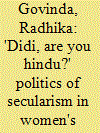

|
|
|
|
|
| Publication |
2013.
|
| Summary/Abstract |
In this paper I take the women's movement as the site for unpacking some of the strains and tensions involved in practical interpretations of secularism in present-day India. Several sources within and outside the movement point out that there has been a tendency to take the existence of secularism for granted, and that the supposedly secular idioms and symbols used for mobilizing women have been drawn from Hindu religio-cultural sources. Women from Dalit and religious minority communities have felt alienated by this. Hindu nationalists have cleverly appropriated these idioms and symbols to mobilize women as foot soldiers to further religious nationalism. Through a case-study of a grassroots women's NGO working in Uttar Pradesh, I seek to explore how women's organizations may be reshaping their agendas and activism to address this issue. Specifically, I will examine how and why the 2002 Gujarat riots affected the NGO, the ways in which it has started working on the issue of communal harmony and engaging with Muslims since the riots, and the challenges with which it has been confronted as a result of its efforts. In doing so, I will show how the complexities of NGO-based women's activism have become intertwined with the politics of secularism.
|
|
|
|
|
|
|
|
|
|
|
|
|
|
|
|
| 2 |
ID:
133883


|
|
|
|
|
| Publication |
2014.
|
| Summary/Abstract |
Access to public health care has often been equated with health outcomes. Outcomes-based analysis often misunderstands the process of access to health. This article conceives access to health as a bundled concept and decomposes access into availability, affordability and acceptability. Access to health is determined by public provisioning as well as by socio-economic characteristics of households. It attempts to examine these dimensions across different regions of the Indian state of Uttar Pradesh (UP). It shows that there are variations across regions and socio-economic characteristics of households. A particular group from one region may not have the same degree of access as its counterpart in another region and at the same time there are variations across groups in the same region. The scale of development of regions also plays an important role in promoting or hindering access to health.
|
|
|
|
|
|
|
|
|
|
|
|
|
|
|
|
| 3 |
ID:
118562
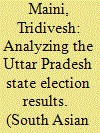

|
|
|
| 4 |
ID:
118868


|
|
|
| 5 |
ID:
119395
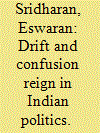

|
|
|
|
|
| Publication |
2013.
|
| Summary/Abstract |
[T]he prospect of India without a stable governing coalition-whether established by the Congress Party, by the BJP, or by regional parties supported by either the Congress or the BJP-is not beyond the realm of possibility.
|
|
|
|
|
|
|
|
|
|
|
|
|
|
|
|
| 6 |
ID:
106452


|
|
|
|
|
| Publication |
2011.
|
| Summary/Abstract |
When political parties organize, compete and maintain interests at different levels, they bring interconnections both between as well as horizontally across levels. This study suggests that the autonomy of state politics formulation may have to pay greater attention to the federal framework and give more consideration to the role of polity-wide parties. This study uses the autonomy thesis as a heuristic tool and expands the discussion beyond state politics as considered by Yogendra Yadav-Suhas Palshikar. It examines the interface between the rise of the state as the primary unit and the functioning of political parties, especially in a multi-party competitive scenario where parties are forced to enter into coalitions. By situating India and its coalition experiences within a broader literature of comparative politics, the study tries to enrich our understanding about the relationship between federalism, political parties and coalition politics.Government
S
|
|
|
|
|
|
|
|
|
|
|
|
|
|
|
|
| 7 |
ID:
102040
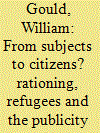

|
|
|
|
|
| Publication |
2011.
|
| Summary/Abstract |
Building on recent work on the 'everyday state' and citizenship in 1947-1948, this paper examines changing practices and representations of 'corruption' in Uttar Pradesh, India over independence. The management and publicity of 'corruption', particularly in the food supply and rationing bureaucracy from the mid-1940s to the 1960s captures changing discussions about public expectations of government and narrates everyday urban experiences of the local state. Representations of administrative corruption within UP government 'anti-corruption' planning, around the late 1930s to early 1940s, reflected changing ideas about the public and citizenship in UP in general-from a colonial stress on administrative authoritarianism, where corruption was presented as a regrettable but unavoidable facet of local power, to a sense of public accountability. By the 1940s, with war-time commodity controls accompanying rapid political change, opportunities for nefarious gain widened, and administrative rules and functions quickly became much more complex. 'Corruption', as a symbolic political weapon, was publicized in a way which now connected national, state and local level discussions of independence, citizenship and state authority. Specifically, the very nature of different types of corruption in the crucial sphere of controls and rationing brought about more developed forms of political protection and backing for the corrupt administrator and encouraged new clientelist networks across the political spectrum.
|
|
|
|
|
|
|
|
|
|
|
|
|
|
|
|
| 8 |
ID:
118616
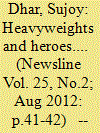

|
|
|
| 9 |
ID:
031313
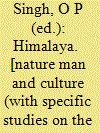

|
|
|
|
|
| Publication |
New Delhi, Rajesh Publications, 1983.
|
| Description |
xx, 379pHbk
|
|
|
|
|
|
|
|
|
|
|
|
Copies: C:1/I:0,R:0,Q:0
Circulation
| Accession# | Call# | Current Location | Status | Policy | Location |
| 022123 | 910.0215496/SIN 022123 | Main | On Shelf | General | |
|
|
|
|
| 10 |
ID:
171459
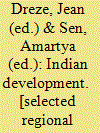

|
|
|
|
|
| Edition |
South Asia Ed.
|
| Publication |
New Delhi, Oxford University Press, 1997.
|
| Description |
xx, 420p.: figures, tablespbk
|
| Series |
UNU-Wider Studies in Development Economics
|
| Standard Number |
9780198865674
|
|
|
|
|
|
|
|
|
|
|
|
Copies: C:1/I:0,R:0,Q:0
Circulation
| Accession# | Call# | Current Location | Status | Policy | Location |
| 059870 | 338.954/DRE 059870 | Main | On Shelf | General | |
|
|
|
|
| 11 |
ID:
090304
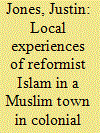

|
|
|
|
|
| Publication |
2009.
|
| Summary/Abstract |
This paper discusses shifts within Islamic life, ritual and practice in the town of Amroha in the United Provinces of India, during the eventful period of approximately 1860-1930. Based primarily upon Urdu writings produced about or by Muslim residents of the town during this period, it examines the ways in which wider religious reformist movements such as those associated with Aligarh, Deoband and Bareilly were received and experienced within nearby smaller, supposedly marginal urban settlements. The paper argues that broader currents of religious reform were not unquestioningly accepted in Amroha, but were often engaged in a constant process of dialogue and accommodation with local particularities. The first section introduces Amroha and its sharif Muslim population, focusing upon how the town's Islamic identity was defined and described. The second section examines a plethora of public religious rites and institutions emerging during this period, including madrasas and imambaras, discussing how these were used by eminent local families to reinforce distinctly local hierarchies and cultural particularities. A third section considers public debates in Amroha concerning the Aligarh movement, arguing that these debates enhanced local rivalries, especially those between Shia and Sunni Muslims. A final section interrogates the growing culture of religious disputation in the town, suggesting that such debate facilitated the negotiation of religious change in a transitory social environment.
|
|
|
|
|
|
|
|
|
|
|
|
|
|
|
|
| 12 |
ID:
145391
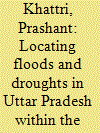

|
|
|
|
|
| Summary/Abstract |
The Indian scenario of disaster management is largely guided by two documents viz- the Disaster Management Act (DMA), 2005 and the National Policy on Disaster Management (NPDM), 2009. As recently as on February 26, 2013, a multi-stakeholder National Platform for Disaster Risk Reduction (NPDRR) has been constituted by the Government which is headed by the Union Home Minister and which has a tenure of not more than five years, after which a review of its constitution shall take place.
|
|
|
|
|
|
|
|
|
|
|
|
|
|
|
|
| 13 |
ID:
152349
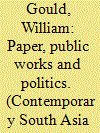

|
|
|
|
|
| Summary/Abstract |
In moving away from older linear narratives around the costs and benefits of ‘corruption’ to development and democratic processes, social scientists have tended to downplay temporality in their work on the phenomenon in the global South. Historical research, however, offers a different kind of nuance around moments in which corruption becomes important in political and administrative discourse. Examining archives on corruption in detail and comparatively poses different questions about the operation of the everyday state. It also provides alternative means for exploring the nature of citizenship, national belonging in India and how the disempowered are often unevenly affected by corrupt acts. Using two case studies in the Public Works Department during state transition in the late 1940s and early 1950s, in India’s most populous state, Uttar Pradesh, this article examines how archives convey multiple and contingent meanings to early postcolonial discourses of ‘corruption’. Such archives present the phenomenon as a vehicle or symbolic resource for larger political processes over the period. This potentially challenges our perspective on some of the larger questions surrounding the early postcolonial state, the nature of civil/political society in that period for India, ideas of national belonging and the relationship between India and Pakistan.
|
|
|
|
|
|
|
|
|
|
|
|
|
|
|
|
| 14 |
ID:
165245
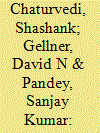

|
|
|
|
|
| Summary/Abstract |
The city of Gorakhpur presents what may be a unique, and is certainly an unusual, configuration of religion and politics. The sitting MP from 1998 to 2017, Yogi Adityanath, a Hindu monk, had one of the safest seats in India and won five parliamentary elections in a row, a career that culminated in his appointment as the BJP Chief Minister of Uttar Pradesh in 2017. Adityanath was both an effective constituency MP and the head of a thriving Math (Hindu monastic temple). Gorakhpur used to be famous for its lawless image and gang warfare. We seek to explain how politics in Gorakhpur have evolved through three distinct periods: (1) Congress hegemony and Hindu-Muslim harmony at the local level; (2) intensified caste competition and the rise of muscular politics; (3) the impact of new caste politics (with the rise of caste-based parties such as the SP and BSP), with the Math as the focus of Gorakhpur’s ever-stronger Hindu-based political identity. The BJP’s loss of the Gorakhpur seat in 2018, in a by-election consequent on Adityanath’s elevation to Chief Minister of UP, may be interpreted as a (probably temporary) rejection of the BJP, but it does not represent a loss of influence by the Math.
|
|
|
|
|
|
|
|
|
|
|
|
|
|
|
|
| 15 |
ID:
114014
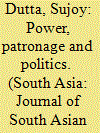

|
|
|
|
|
| Publication |
2012.
|
| Summary/Abstract |
This paper conceptualises the culture of corruption and clientelism in panchayat elections in Uttar Pradesh. The discussion is based on a year of field research on the strategies adopted by power-holders to monopolise these local bodies. The study found that patronage, influence and intimidation are used by the dominant factions to retain considerable control over the panchayats. While this in itself is not especially new, the study demonstrates the ways in which government initiatives to ensure greater transparency and representation of marginal groups-lower castes and women, in particular-through reservations continue to be cleverly subverted. A successful pradhan (headman) establishes a network of supporters and alliances, which he nurtures and rewards by brokering and embezzling funds through the institutions that he controls, instead of neutrally devolving funding to the needy sectors of the village.
|
|
|
|
|
|
|
|
|
|
|
|
|
|
|
|
| 16 |
ID:
095527
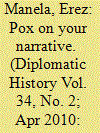

|
|
|
|
|
| Publication |
2010.
|
| Summary/Abstract |
When Dr. Viktor M. Zhdanov, Deputy Minister of Health of the Soviet Union, arrived in Minneapolis, Minnesota, in May 1958 to attend the annual meeting of the World Health Assembly (WHA), the governing body of the World Health Organization (WHO), the visit was not routine.1 Reflecting Soviet premier Nikita Khrushchev's new policy of "peaceful coexistence" with the West, it marked the first time that a Soviet delegation had been sent to that forum since the establishment of the WHO ten years earlier.2 And Zhdanov made his mark, calling on the organization to launch a global campaign to eradicate smallpox, one of humankind's oldest and deadliest diseases. Mindful of the meeting's venue, he began his call with a quote from a letter that U.S. president Thomas Jefferson had written to Edward Jenner, discoverer of the smallpox vaccine, more than a century and a half earlier. The discovery, Jefferson had written the English physician in 1806, would ensure that "future nations will know by history only that the loathsome small-pox has existed.
|
|
|
|
|
|
|
|
|
|
|
|
|
|
|
|
| 17 |
ID:
143243
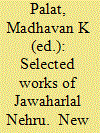

|
|
|
|
|
| Publication |
New Delhi, JawaharLal Nehru Memorial Fund, 2015.
|
| Description |
xxvi, 602p.: ill.hbk
|
| Series |
Second Series
|
| Contents |
Vol. XLIV (64): 1 - 30 November 1960
|
| Standard Number |
9780199465910
|
|
|
|
|
|
|
|
|
|
|
|
Copies: C:1/I:0,R:0,Q:0
Circulation
| Accession# | Call# | Current Location | Status | Policy | Location |
| 058462 | 954.042/PAL 058462 | Main | On Shelf | General | |
|
|
|
|
| 18 |
ID:
181683
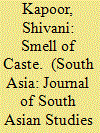

|
|
|
|
|
| Summary/Abstract |
Leather was an important commodity for the British empire in terms of industrial production and scientific innovation. From the mid nineteenth century in India, the British sought to convert leatherwork into a scientific industry. Leather, however, also has a life in caste. The profound stench inherent to the process of leather tanning marks leather workers as polluted. Examining archival material and contemporary ethnography from Uttar Pradesh, this paper examines how the scientific colonial intervention in leatherwork was made complicated due to the sensorial politics of caste. The leather chemist, trained to impart scientific knowledge to leather workers, often failed to negotiate the caste-based sensorial nature of leatherwork, thereby allowing caste to limit the reach of modern science in the industry. Understanding this interaction between colonial science and leatherwork has important consequences for our understanding of the politics of caste and scientific knowledge in India.
|
|
|
|
|
|
|
|
|
|
|
|
|
|
|
|
| 19 |
ID:
090595
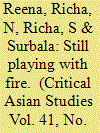

|
|
|
|
|
| Publication |
2009.
|
| Summary/Abstract |
This coauthored article is part of Sangtin Kisaan Mazdoor Sangathan's (SKMS) efforts to participate in the coproduction of dialogical/dialectical relationships between theory and practice, the lettered and the unlettered, academia and activism, and the fields inhabited by members of SKMS, nongovernmental organizations (NGOs), and academic scholars.We narrate two intertwined tales based on dialogues among four members of SKMS in the context of producing the first four issues of SKMS's community newspaper, Hamara Safar. The first tale focuses on the political transformation of Sangtin, an organization that was conceptualized in 1998 as an NGO for rural women's empowerment based on the mainstream donor-based model of social change. A three-year-long process of critical reflection and writing by nine women on the politics of caste, class, religion, and gender in the context of rural development and women's empowerment programs - as well as on the global politics of knowledge production - paved the way for the emergence of SKMS, an organization that today consists of over five thousand poor farmers, manual laborers, and their families, most of them dalit. SKMS believes that definitions and processes of empowerment must evolve from rural people's struggles and active participation, instead of emerging from donor institutions, NGO headquarters, university-based experts, or think tanks-and then being applied to the rural people. The second story focuses on some of the hurdles in the path of SKMS as it remains grounded in feminist principles, but refuses to work exclusively with women. Together, the two intertwined stories map the archaeology of the shift from Sangtin to SKMS and some of the larger questions pertaining to "women's issues," "feminist politics," and "transnational collaborations" that this shift has opened up.
|
|
|
|
|
|
|
|
|
|
|
|
|
|
|
|
| 20 |
ID:
106716
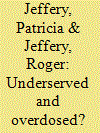

|
|
|
|
|
| Publication |
2011.
|
| Summary/Abstract |
During the 2000s, confirmed polio cases in India have been increasingly localised in Uttar Pradesh (UP) and Bihar, especially amongst Muslim children. Muslims have also been at the sharp end of the Pulse Polio Initiative (PPI) and the associated 'Underserved Strategy' designed to counter civilian resistance to the programme. Our critique of the PPI draws on long-term research in rural UP and focuses on the programme's socio-political implications. We discuss popular rumours about polio vaccine and official responses to resistance. Taking a longer term view of top-down single-issue public health programmes, we argue that Muslims in western UP, as a marginalised minority, have good reason to be suspicious of the PPI. Moreover, the PPI arguably reflects the agendas of global funders, not the priorities of local communities. Villagers - Hindu and Muslim alike - have repeatedly criticised government health services for failing to deal with the health issues that worry them most. Their concerns echo other critiques of the PPI, particularly the diversion of resources from other health-related activities that could address the social determinants of health and health inequalities.
|
|
|
|
|
|
|
|
|
|
|
|
|
|
|
|
|
|
|
|
|